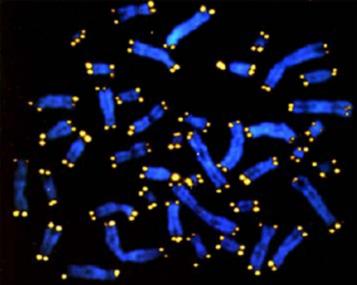By Suzanne Leigh | Originally published on UCSF News

Telomeres are shown in yellow at the ends of chromosomes.
Major childhood psychological and social stressors, such as trouble with the police and parental substance abuse, increase the odds of shorter telomere length in adulthood, according to a study led by researchers at UC San Francisco.
“This was the first study of telomere length to undertake a lifespan approach,” said co-lead author Eli Puterman, PhD, a former assistant professor of psychiatry at UCSF who is currently Canada Research Chair in physical activity and health in the School of Kinesiology at the University of British Columbia. “We looked at a wide range of stressful situations experienced over the course of childhood and adulthood to examine the independent and combined impact of these stressors on telomere length.”
Telomeres are DNA-protein caps at the ends of chromosomes that protect genes from deterioration. A large body of previous research has shown that short telomeres are linked to an increased risk of non-communicable illnesses in adulthood, such as cardiovascular disease and cancer.
Four stressors associated with shortened telomeres
After controlling for many other health factors, the scientists found that neither adulthood adversity nor family financial setbacks during childhood appeared to have an effect on telomere length. However, four childhood stressors in particular had a significant association with short telomeres: trouble with the police, repeating a grade in school, physical abuse and parental abuse of drugs and alcohol.
No particular one of these adverse experiences stood out as any more important than the others, but together, they were detrimental. The study found that the greater the number of such stressors, the greater the chance of shortened telomeres, with the likelihood of having shorter telomeres increasing by 19 percent with each additional stressor.
The research team analyzed data collected over 16 years from 4,598 men and women in the U.S. Health and Retirement Study (HRS), a nationally representative study of health and economic well-being in adults 50 and older, which is supported by the National Institute on Aging. The study was published in Proceedings of the National Academy of Sciences of the United States of America on Oct. 3, 2016.
“HRS is able to include the kind of large, diverse and nationally representative group of participants needed to detect these intriguing effects of lifetime experience on our fundamental biology," noted HRS director and study co-author David Weir, PhD, of the University of Michigan.
Study echoes lessons about childhood trauma
“Adversity in childhood turns out to cast a long shadow on adulthood health, as indicated by telomere length,” said Puterman. “This speaks to the need to reduce children’s exposure to these stressors through policy initiatives and intervention strategies within the family.”
The study echoes lessons from the field of childhood trauma regarding the cumulative impact of multiple stressors, according to co-lead author Elissa S. Epel, PhD, who is a professor of psychiatry at UCSF.
“Telomeres are influenced by our genetics, lifestyle and lifetime experiences, rather than any one particular challenging experience,” Epel said. “This study shows that when negative experiences add up, that’s when we see an effect on physiology or health. But the good news is that there are many protective psychological and social factors that shield people from lasting negative effects of childhood adversity, such as strong supportive relationships.”
Co-authors are Alison Gemmill and Deborah Karasek of UC Berkeley; and Nancy E. Adler, PhD, and Aric A. Prather, PhD, of UCSF.
The study was supported by funds from the Canada Research Chairs Program, the National Institutes of Health, and the Robert Wood Johnson Foundation Health and Society Scholars Program.
About UCSF Psychiatry
The UCSF Department of Psychiatry and the Langley Porter Psychiatric Institute are among the nation's foremost resources in the fields of child, adolescent, adult, and geriatric mental health. Together they constitute one of the largest departments in the UCSF School of Medicine and the UCSF Weill Institute for Neurosciences, with a mission focused on research (basic, translational, clinical), teaching, patient care, and public service.
UCSF Psychiatry conducts its clinical, educational, and research efforts at a variety of locations in Northern California, including UCSF campuses at Parnassus Heights, Mission Bay, and Laurel Heights, the UCSF Medical Center at Mt. Zion, Zuckerberg San Francisco General Hospital and Trauma Center, the San Francisco VA Health Care System, and UCSF Fresno.
About the UCSF Weill Institute for Neurosciences
The UCSF Weill Institute for Neurosciences, established by the extraordinary generosity of Joan and Sanford I. "Sandy" Weill, brings together world-class researchers with top-ranked physicians to solve some of the most complex challenges in the human brain.
The UCSF Weill Institute leverages UCSF’s unrivaled bench-to-bedside excellence in the neurosciences. It unites three UCSF departments—Neurology, Psychiatry, and Neurological Surgery—that are highly esteemed for both patient care and research, as well as the Neuroscience Graduate Program, a cross-disciplinary alliance of nearly 100 UCSF faculty members from 15 basic-science departments, as well as the UCSF Institute for Neurodegenerative Diseases, a multidisciplinary research center focused on finding effective treatments for Alzheimer’s disease, frontotemporal dementia, Parkinson’s disease, and other neurodegenerative disorders.
About UCSF
UC San Francisco (UCSF) is a leading university dedicated to promoting health worldwide through advanced biomedical research, graduate-level education in the life sciences and health professions, and excellence in patient care. It includes top-ranked graduate schools of dentistry, medicine, nursing and pharmacy; a graduate division with nationally renowned programs in basic, biomedical, translational and population sciences; and a preeminent biomedical research enterprise. It also includes UCSF Health, which comprises two top-ranked hospitals, UCSF Medical Center and UCSF Benioff Children’s Hospital San Francisco, and other partner and affiliated hospitals and healthcare providers throughout the Bay Area.





